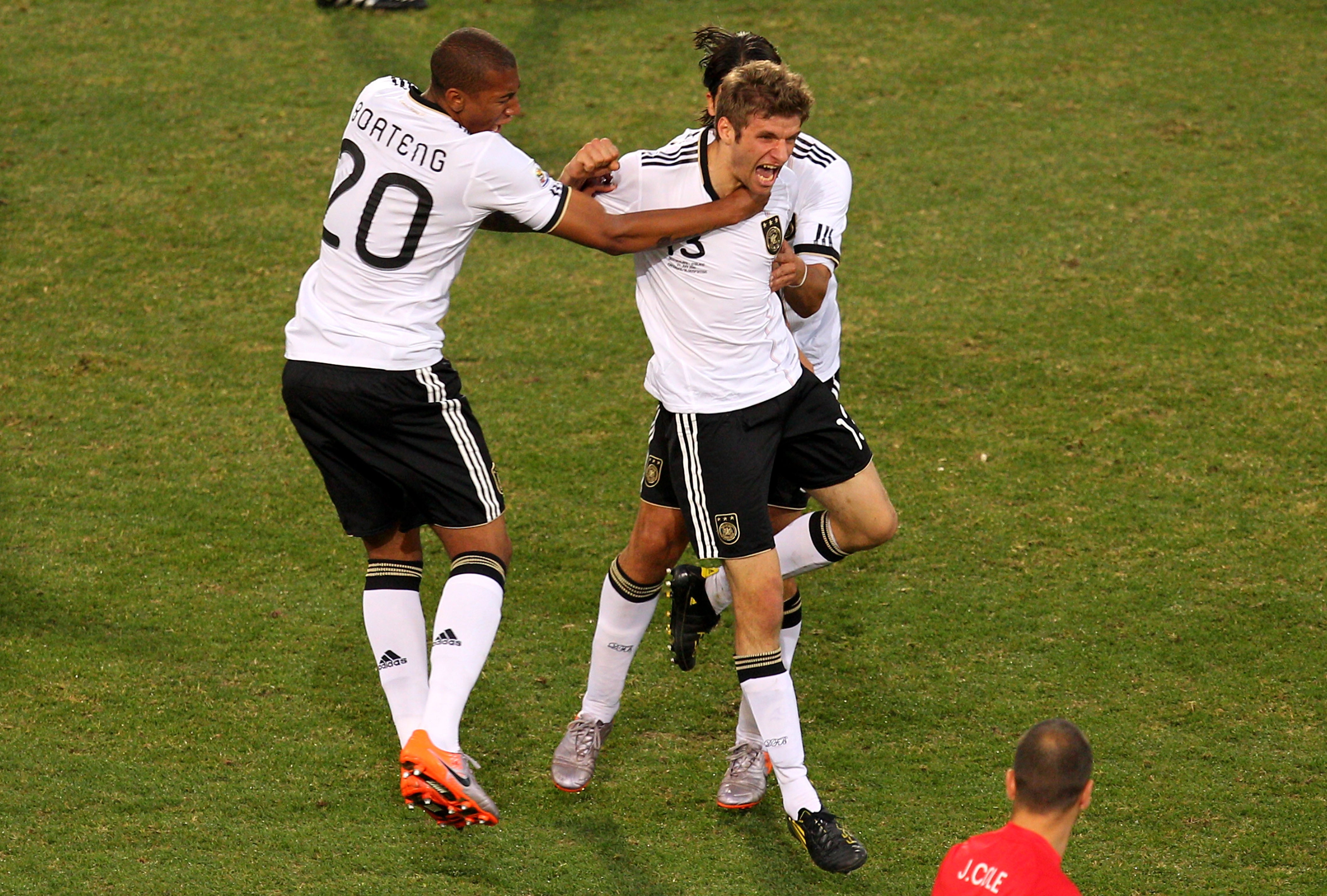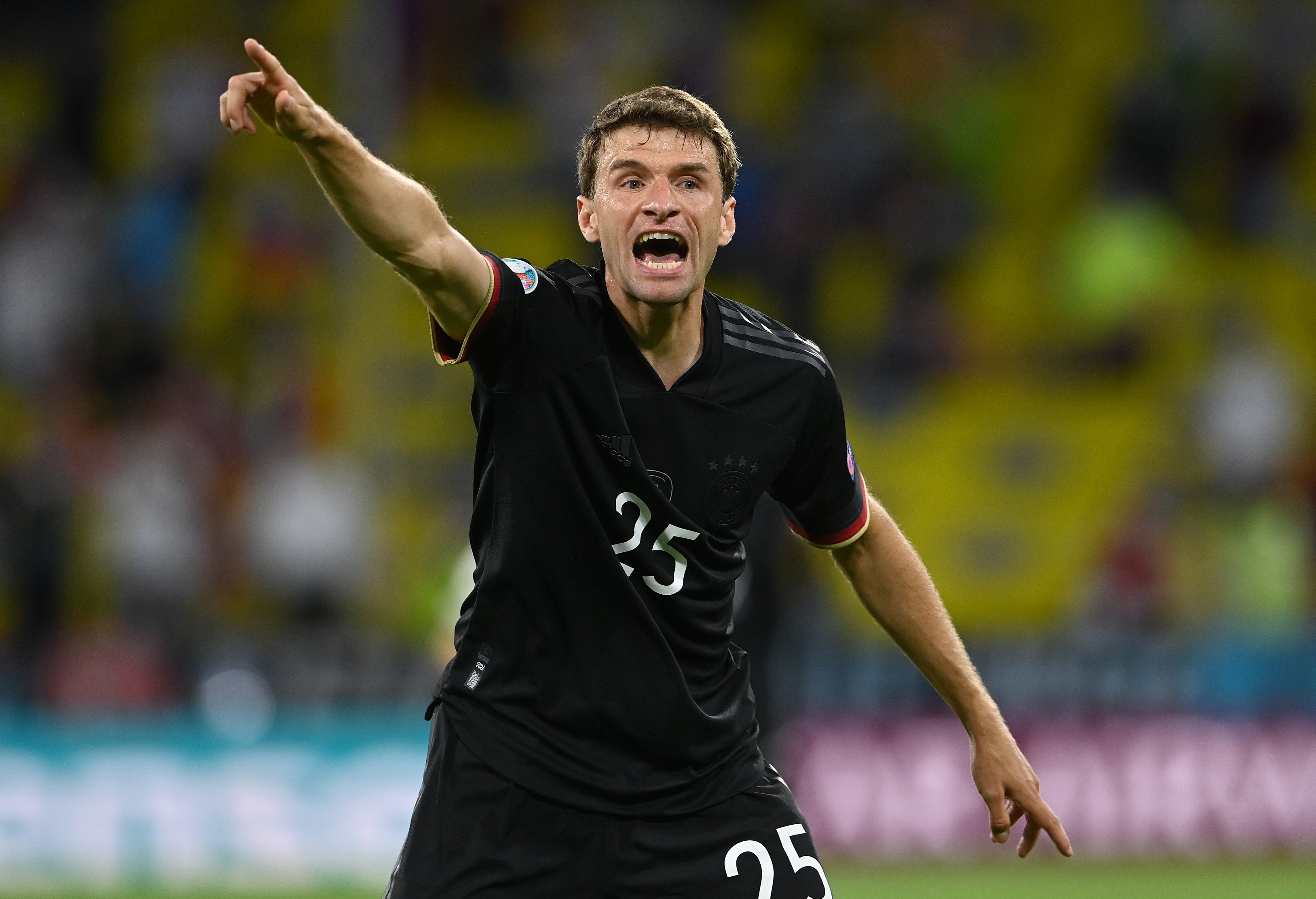
There is something a little unsettling about the way Thomas Müller moves. There always has been.
For most fans around the world, their earliest memories of the gangly, ungainly German roaming around the pitch will date back to the 2010 World Cup in South Africa, his maiden major tournament. That will certainly be the case for English supporters.
If you watch back the last-16 tie between Germany and England – the nations’ last meeting on such a stage – you will see the most devastatingly effective of performances from Müller, who was still just 20 years old at the time.
Deployed by Joachim Löw on the right flank, the Bayern Munich man who would soon develop into the archetypal Raumdeuter – “space interpreter” – is given plenty of space to interpret by centre-backs Matthew Upson and John Terry. The pair are constantly being suckered in by the movement of Miroslav Klose in the middle of Germany’s front three, while Lukas Podolski marauds on the left.
It is from that space on the right that Müller, while stumbling as if he also interprets gravity differently to every other human, somehow slips the most tantalising of through balls into Klose exactly as the game clock hits 30 minutes in Bloemfontein.
Recommended
David James denies the striker, but Germany are already 1-0 up and carving through England at will, with Müller always lurking opportunistically.
A little over 90 seconds after he has teed up Klose’s missed chance, Müller – again seemingly off-balance – manages to find his stride to slip between Upson, Terry and Ashley Cole. Perhaps the German is even suppressing a smirk at the way he has stripped all three of any positional awareness as he accelerates to the edge of the box before (actually rather deftly) lifting the ball over Glen Johnson and to Podolski, who superbly slides a shot under James to double his team’s lead.
Five minutes later, Upson goes some way to redeeming himself by heading England back into the game. Within a minute, Frank Lampard’s infamous ghost goal sees the Three Lions’ chance to dramatically turn the tie on its head evaporate in the Bloemfontein humidity, amid the ceaseless hum of vuvuzelas.
A largely youthful and mostly inexperienced Germany look momentarily rattled, with Lampard himself rattling the bar early in the second half from a long-range free-kick, but whose composure looks least likely to desert them?
Externally, admittedly, Müller does not exactly exude composure, sliding short of a Sami Khedira pass into the England box, punting a shot before colliding with Cole. But on the inside, Müller has the game in his grasp, whether or not the game is yet aware.

On 66 minutes, he pounces on a disgracefully muddled England defence. Cole, accidentally filling in at right centre-back, has unknowingly left the Germany forward unguarded on England’s left, and the 20-year-old blasts a shot past James.
The way Müller transitions so quickly from perfect technique to his now-trademark stiff celebration via an awkward wobble is bewildering, a moment that suggests he interprets time differently to any other human, as well as space and gravity. Yet it encapsulates the disarming, unconventional beauty of the player’s game.
Soon thereafter, Müller almost comically scuffs a shot wide with the outside of his boot, as if forgetting what kind of goals he was put on this earth to score.
Three minutes later, he indeed scores one such goal, gleefully delivering a sucker-punch to England by getting on the end of a cruel pass slipped between Cole’s legs by Mesut Özil – another player that Fabio Capello’s side just can’t live with. Müller ends a run of insatiable determination by burying the ball in the back of James’s net.
In some ways, the undoing of England felt like the making of Thomas Müller. In the shortest term, the forward would go on to win the Golden Boot in South Africa with five goals and three assists. In the longer term, he would grow into a player synonymous with the term Raumdeuter while becoming a 10-time Bundesliga winner, two-time Champions League titlist and world champion.
Those are just some of Müller’s honours. Aged 31, there are surely many more to come, yet he feels like one of Germany’s old guard at Euro 2020.

The decision by Löw to drop Müller following Germany’s disastrous 2018 World Cup campaign was misguided, something the coach seemed to acknowledge by recalling the forward for this summer’s Euros – Löw’s final tournament in charge of Die Mannschaft.
In goal for Germany, Manuel Neuer is the only other remaining member of the team that thrashed England in South Africa.
While Müller was just a substitute in Germany’s group-stage finale against Hungary, he could certainly come back into focus against England in the last 16.
While his role is somewhat different now, the hunger has never left him.







